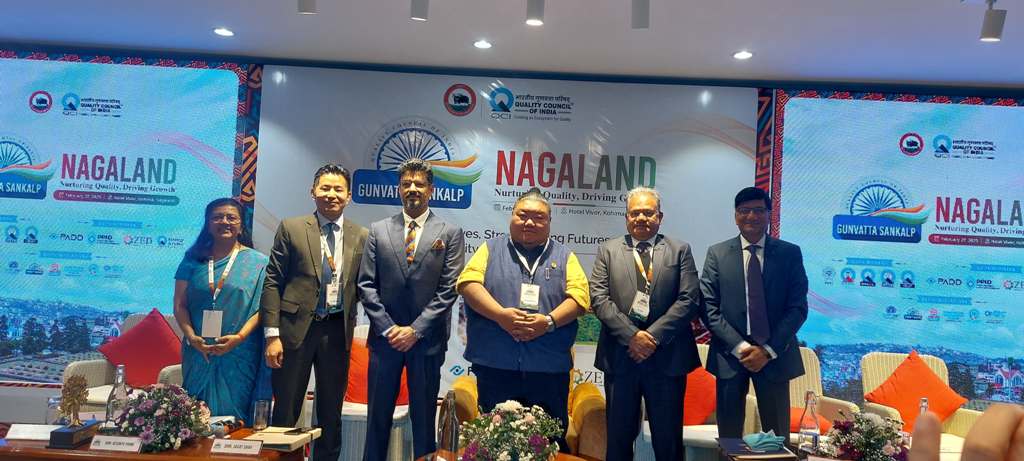MONDAY, MAY 19, 2025
- Home
- Quality Council of India highlights Nagaland’s potential; government seeks case study on road challenges
Quality Council of India highlights Nagaland’s potential; government seeks case study on road challenges
Published on Feb 27, 2025
Share

Temjen Imna Along, Jaxay Shah, Dr. J Alam, Kesonyu Yhome, and other officials of QCI on Thursday in Kohima. (EM Images)
- KOHIMA — The Quality Council of India (QCI) highlighted Nagaland’s potential in sustainability, entrepreneurship, and organic farming—while Nagaland government urged the QCI to conduct a case study on rural roads to assess challenges and improve infrastructure development.
- This trade-off took place at the Gunvatta Sankalp held on Thursday at Hotel Vivor in Kohima.
- Addressing the event, Minister for Tourism and Higher Education, Temjen Imna Along, asserted that the people of Nagaland can set a standard for the rest of the country to admire and benefit from the strong human resource qualities of the state.
- While the QCI team continues their pursuit of excellence and quality for the people, he assured that the state would partner with them and appealed to them to understand the small hitches, glitches, and problems of the state.
- Claiming that what comes from newspapers and media alone does not define the quality of Nagaland, Along stated that the quality of Nagaland lies in its common people and in the aspirations of its people.
- He pointed out that Nagaland has more than 2,300 villages—and its culture and heritage are the state’s brand.
- The minister further maintained that the quality of higher education in Nagaland has improved significantly due to NAAC grading. With the support of the government, he noted that the department has been able to push forward with quality, leading to a nearly doubled gross enrolment ratio in the state over the last six to seven years.
- He asserted that the state is excited for a future where students from other states will come to study in Nagaland, experiencing its beautiful, traditional, and cultural setting.
- For tourism, he requested the QCI to work with the state based on the request made by the chief secretary of Nagaland. He urged them to establish a regional office in Nagaland to ensure quality and to recognise the demographic and traditional challenges that are difficult for authorities in Delhi to grasp fully.
- Furthermore, Along pointed out that the Gross State Domestic Product (GSDP) of Nagaland’s service sector is 61%, which is above the national average.
- Chief Secretary, Dr. J Alam acknowledged the QCI, which was represented by a 40-member delegation led by its Chairperson, Jaxay Shah. He stated that the government of Nagaland is focussing on quality in almost every sector, adding that quality and innovation are the two buzzwords these days that guide the government's focus.
- He noted that while the state has a Quality Control Board mandated to oversee the quality of roads, buildings, and other infrastructure, it has struggled to achieve its objectives due to inadequate capacity building.
- He also underscored Nagaland’s potential, given its rich natural resources and vast opportunities in various sectors.
- Alam requested the QCI to choose Nagaland if it plans to set up a regional office in the Northeast, aligning with the Act East Policy and the goal of balanced regional growth.
- Chairperson of QCI, Jaxay Shah, in his speech, highlighted that Nagaland seamlessly blends tradition with modern aspirations, where community-driven development is a way of life. He observed that the state values sustainability, entrepreneurship, and excellence—qualities that make it a role model for India and beyond.
- Shah maintained that development is often measured by infrastructure and the economy, but its foundation is quality. He added that quality defines education, healthcare, and industries, enabling global competitiveness. He emphasised that QCI’s role is not to dictate but to support and amplify the state’s efforts.
- He pointed out that Nagaland’s rich handloom traditions—such as Chakhesang shawls, Lotha weaves, and Ao Naga textiles—tell its cultural story, yet artisans struggle for market access. Strengthening the textile sector can ensure economic empowerment while preserving heritage, he said.
- Shah also highlighted the state’s organic farming practices, emphasising that Nagaland is poised to become a major hub for premium organic exports. Aligning certification and market strategies can unlock this potential, in addition to promoting community-driven tourism and honey products.
- Meanwhile, Commissioner and Secretary to the Chief Minister, Kesonyu Yhome, urged the QCI to conduct a case study on rural roads in the state to gain a deeper understanding of the challenges faced by both the people and the government.
- Yhome, who also oversees the road sector, acknowledged that Nagaland has the dubious distinction of being one of the worst-performing states in rural road development.
- He cited discrepancies between sanctioned road projects and Indian Road Congress (IRC) guidelines. According to IRC SP 72-2015, road shoulders should be made of sub-base quality material, compacted to a thickness of 100 mm. However, he pointed out that only earthen shoulders are sanctioned.
- Similarly, IRC SP 48-2023 recommends eight to 10 culverts per kilometre for effective discharge of runoff from hill sites to valley sites, but only an average of two are sanctioned. He also stressed that sub-soil drainage systems, crucial for preventing pavement failure, are not sanctioned, leading to frequent road failures. Additionally, landslide mitigation measures remain inadequate, with only 30 to 40 metres of Random Rubble or Random Saw Messenger Roads sanctioned per kilometre.
- “When we have IRC guidelines in place, but cost-saving becomes the primary motivation in sanctioning projects, we are left wondering when these standards will be properly adopted,” Yhome remarked.
- He extended an invitation to QCI to undertake a case study on any rural road in Nagaland to assess the reasons behind road failures. “We will provide all possible support, but we request that the study be conducted at QCI’s own expense to ensure an independent and neutral assessment,” he added.

